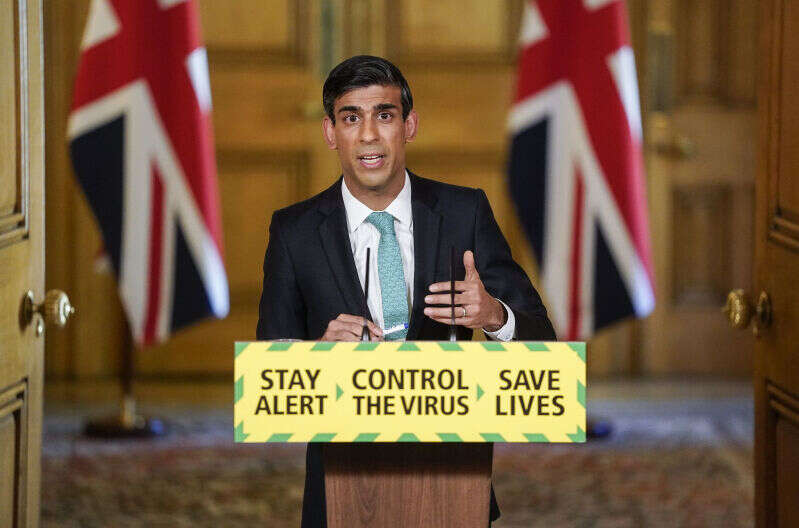
“Forgotten” freelance journalists who work on PAYE contracts are begging the Government for support as the Covid-19 crisis approaches the three-month mark.
Chancellor Rishi Sunak has extended the Self-Employed Income Support Scheme, meaning those eligible can claim a second grant capped at £6,570 in August.
But those for whom PAYE earnings comprise more than 50% of their income remain ineligible – including thousands of people who do regular shifts at news publishers and broadcasters.
Freelance showbiz journalist, TV presenter and events host Ellie Phillips told Press Gazette she feels she is “one of the lucky ones”– she has managed to secure a few shifts and has the financial support of her boyfriend who, as a key worker, is still working.
She is using her time to collate people’s experiences so she can try to drum up awareness to change SEISS so freelances who earn more than 50% of their income through PAYE can access it.
She has heard stories from a single dad living on his friend’s sofa who is unsure where his next meal is coming from, to a woman “ashamed” to have moved back in with her parents.
Phillips pointed out that people are often urged to save three months’ salary before going freelance – but that even if they had done so, that time is now up.
“So even the people who did take the precautions who somehow managed even though they are earning minimum wage in London where it costs so much to travel and sleep and live to save up those three months’ wages, that time is up now,” she said. “And there’s no hope to be found.”
Freelance picture editor Debbie Hassan told Press Gazette she assumed she was classed as self-employed and therefore eligible for SEISS until she was told otherwise by HMRC.
The company where Hassan gets all of her work, which she does not wish to be identified, is not furloughing freelance staff – they are able to do so, but not obliged – and is cutting shifts instead.
The 45-year-old mum from Enfield, who looks after her children on the days she doesn’t have a shift, said: “This is why I loved doing freelancing, it works out really well because I can stop and start.
“But I didn’t realise with this pandemic that I would stop for a good solid three or four months, and then after that I’m left with no work anyway.
“I’ll be lucky if I get any calls after September because they’re all doing cutbacks and cutting freelance shifts.”
Hassan has only had two shifts at one title since the pandemic began – she had shifts at another publication for April cancelled, although her payment was honoured after she took it up with an editor.
She said she was subsequently told by HR to “look for another job”.
Despite working as a picture editor for the past two decades, Hassan said: “I’m thinking maybe I should change careers now because in that industry it’s just got worse. And all the pages are cut – I used to do all the events pages but there are no events going on.”
On 29 May, when the Chancellor extended SEISS to offer a second grant and revealed how the furlough scheme would gradually wind down until October, he said there would otherwise be “no changes and no further extensions to the schemes”.
At the daily press briefing that day, Sunak said: “I do want to acknowledge that we haven’t been able to support everyone in the exact way they would want.

Chancellor of the Exchequer Rishi Sunak during a media briefing in Downing Street on coronavirus on Friday May 29, 2020. Picture: Andrew Parsons/10 Downing Street/Crown Copyright/PA Wire
“I understand some people have felt frustrated. But you were not and have not been forgotten.
“Even if you don’t qualify for the furlough or self-employment schemes, we’ve provided a wide range of support… from discounted loans, to tax cuts, mortgage holidays and enhanced welfare.”
But Phillips said: “We submit tax returns, we’ve done it for many, many years, and we earn under £50,000. So the only reason we are being discriminated against is purely because we are taxed at source and that is so hard to hear.
“We are taxpayers and we’re being treated like criminals. We’ve been treated like we try and groom the system when it’s a system we’ve been forced into.”
Impact on diversity
Another side effect of this decision, Phillips fears, could be a drop in diversity in journalism and the wider media industry.
“You’re going to end up with an industry where only the richest people from the richest backgrounds are able to stay because they are the ones who are okay,” she said.
“Poorer people won’t want to go back into the industry and won’t be able to go back because they’ll feel completely abandoned. They will be so worried it’s too insecure for them to stay in.”
A PAYE freelance BBC Radio producer who shared their story with Phillips said the lack of Government support had exacerbated their existing depression and anxiety. They have had to move back in with their parents because they can no longer afford their rent.
They said: “I feel abandoned and like my contributions to our country through my tax payments are being forgotten.
“It is not fair and it is not right and something which could, it seems, be easily resolved by including us as self-employed people within SEISS but using our P60s or pay slips rather than tax returns. Is that so hard to do?
“Relationships with my friends who are getting support has become strained. We have no idea when this pandemic will end and I don’t know if I will even be successful in getting another job. It is shocking and infuriating that we are not being treated the same as everyone else.
“We provide a crucial service to people in this country and we pay taxes like everyone else and yet you have forgotten us and left us with immense stress and financial pressure during a global pandemic.”
BBC frustrations
More than 200 BBC freelancers who are “not only frustrated but suffering financial hardship and mental distress” have written to the Chancellor pleading for him to either implement changes so that PAYE freelancers can benefit from SEISS or create a specific new scheme.
They said: “It is grossly unfair that PAYE freelancers like us – who pay our taxes and NI at source – remain in a state of limbo, falling between the cracks because of the tax status thrust upon us.”
BBC freelancers are also struggling because the Government advised that the public service side of the organisation is ineligible to use the furlough scheme.
Private companies are able to furlough freelancers if they were working for a company at the scheme’s cut-off date, but some have chosen not to do so.
‘Absolutely no logic’
The National Union of Journalists has also made the case for the “significant number” of PAYE freelancers who are unable to access support.
In a letter co-signed by nine cross-party MPs, NUJ general secretary Michelle Stanistreet said: “There is absolutely no logic why a government would continue to support sections of the working population but not others.
“A third of our members are freelance, they want to know whether they will have a future career. They need the government to provide financial aid until they can get back to work.
“Freelances juggle portfolio careers, with a myriad of employers, employment categories and tax arrangements. That is why many have found themselves not eligible for the SEISS or able to apply for universal credit.
“Many have been pushed into such working arrangements, not out of choice, which made them fall foul of the various criteria set down in the government’s aid package for freelances. Some have had to reinvent themselves as freelances in order to continue making a living after being made redundant from their jobs.”
The Treasury has been contacted for comment.
Email pged@pressgazette.co.uk to point out mistakes, provide story tips or send in a letter for publication on our "Letters Page" blog
